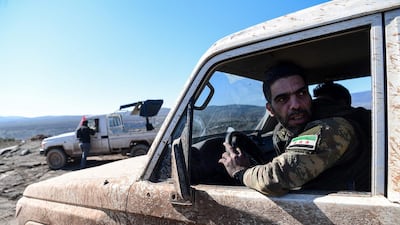The differences between the United States and Turkey are deepening at a much faster pace than either side is willing to articulate. This is a recipe for future catastrophes that will play out in Syrian neighbourhoods in the north and eastern parts of the country.
In the absence of common ground, Turkey’s only available strategy to protect its interests appears to hinge on a Kurdish-Arab civil war in the country. At the same time, Ankara has consistently taken measures that provide space for jihadis as it seeks to advance its national interests.
These policies run counter to Washington’s plan to consolidate its gains against extremism in the country, and both bear blame for an increasingly grim situation.
Whether Turkey deliberately wishes to ignite such a war is unclear. But the result is the same.
Take the battle of Afrin. Hundreds of the rebel fighters who joined the conflict hail from eastern Syria. Those include fighters within Ahrar Al Sharqiyah, a group once linked to Ahrar Al Sham in Deir Ezzor. The group was also part of a network associated with Al Qaeda's former branch in Deir Ezzor until it, along with rebels from the eastern province, was driven out by ISIL in 2014.
Rebels who used to operate in Deir Ezzor scattered in southern and northern Syria. In diaspora, they largely continued to operate within previous factions, but they also mixed with each other and some were courted by jihadi groups in those areas. Also, the former leader of Jabhat Al Nusra in Deir Ezzor, Abu Mariyyah Al Qahtani, is known for ideological flexibility toward other groups and so he maintained close ties with some of the groups.
One of the groups that had sympathisers close to Al Qahtani’s network is Ahrar Al Sharqiyah, even though the group is not linked to him. A similar dynamic existed with other rebel commanders.
There are several other groups like Ahrar Al Sharqiyah that include fighters from other parts of eastern Syria. Some are backed by Turkey, operating in the zone known as the Euphrates Shield, and many of their fighters are currently involved in the fight against the Kurds in Afrin. Such fighters have released footage of themselves shouting anti-Kurdish slogans, and the first rebel fighter to have died in the campaign was reportedly from Deir Ezzor.
____________
Read more from Opinion
Turkey's permanent state of emergency is crippling its chances of development
Trump's State of the Union address marks a troubling back story to the narrative of American success
The most important battle of our times is the war against fake news
____________
These fighters may be a minority in the fighting forces used by Turkey to launch the assault in Afrin. But there should be no question about the implications of having those fighters engage in a war that primarily serves Turkish interests. As I explained in these pages last week, many of those had no choice, by virtue of long-running Turkish support, but to take part in an avoidable war.
The US could have engaged a large number of those fighters who hail from eastern Syria in the fight against ISIL in eastern Syria. The US has had a shortage of forces fighting against the group, factors that both slowed down the campaign and caused avoidable destruction in places like Raqqa and Deir Ezzor. Despite the shortage, American officials opposed the involvement of such factions, even though at least two of them were vetted by the Pentagon and the CIA and had fought against ISIL at least a year before the US-led campaign began.
What will happen to those fighters in the future? Does the US hope they will remain away from their towns and villages indefinitely? Worse, what might be the implications of those same fighters after having been involved in a Turkish-led assault against the Kurds in Afrin? These circumstances add to tension that existed between Arab and Kurdish fighters since the early months of the Syrian conflict.
It will probably take time before American officials recognise the costs of their short-sighted policies in Syria. Given the current momentum against jihadis, it is easy for policymakers to take no notice of dynamics that will shape future challenges.
Besides infiltration and growing ethnic, social and political tensions, there are also attempts by jihadis to take advantage of the Turkish focus on the Kurds to profit financially. Last year, for example, a senior jihadi told this author about jihadi operatives relocating from central and northwestern Syria to the Turkish-protected zone, in anticipation of Turkish plans to rebuild areas captured from ISIL. Similarly, BBC Arabic reported last week that Hayat Tahrir Al Sham, as Jabhat Al Nusra is now known, also attempts to benefit from the flow of arms to Afrin through the involvement of its operatives there.
Turkey’s alliance with Russia in Syria is another issue that adds complexity to the American role in Syria. This alliance allows Russia to shape Syria’s political and military direction, as well as permits groups like Hayat Tahrir Al Sham to serve as party to the de-escalation zones agreed between the two countries. The group escorted Turkish forces in Idlib in October. Two weeks ago, its leader also issued a statement confirming that his group struck a deal with Ankara regarding the Turkish entry to Idlib.
Despite attempts by Turkey to spin the latest developments, as weakening of such groups, the reality is different: Turkish moves in northern Syria are already strengthening groups that the US seeks to weaken and planting the seeds of a needless civil strife that Washington wants to avoid.

